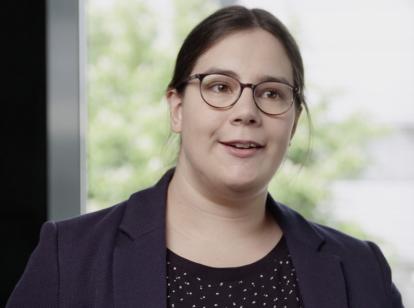Dr.-Ing. Alexandra Rommerskirchen receives Bertha Benz Price
The engineering scientist Dr.-Ing. Alexandra Rommerskirchen is awarded the Bertha-Benz Price 2021 for her dissertation entitled "Continuous flow-capacitive deionization", which she prepared at the DWI - Leibniz Institute for Interactive Materials and the Chair of Chemical Process Engineering (AVT.CVT) at RWTH Aachen University.
Extremely original and clearly structured: This is how PhD supervisor Prof. Dr.-Ing. Matthias Wessling describes Alexandra Rommerskirchen's work. She has now been awarded the Bertha Benz Prize for this excellent work. This award honors young female engineers who have created added value for society with the results of their dissertation and who have shown pioneering spirit, courage and visionary character. The prize is awarded by the Daimler and Benz Foundation and is endowed with 10,000 euros.
Water is essential for all life on earth. In addition, it also plays an indispensable role in many agricultural and industrial processes. As part of her dissertation, Alexandra Rommerskirchen focused on a desalination process to make industrial processes more efficient and sustainable. "Many production processes generate wastewater streams with high salt contents. In order to both reduce environmental pollution and conserve resources, it is necessary to purify the process water and thus recover the dissolved salts," explains the engineer. This is made possible by the continuous flow-capacitive deionization technology she has developed.
In this process, two electrodes are utilized, between which the salt water flows. The contained salt is charged and attracted to the electrodes. In order to absorb as many saltwater ions as possible, the engineering scientist used flowable carbon electrodes. The salt-laden electrodes are regenerated in another module, where the salt is concentrated. Both the electrodes and the salts can then be reused. In this way, the process can be operated continuously on the one hand and the resources can be reused for further processes on the other. "With this new technology, we can now target streams that were previously considered non-processable," explains Rommerskirchen's doctoral supervisor and member of the scientific leadership at DWI Prof. Dr.-Ing. Matthias Wessling.
Through her interdisciplinary work, the process engineer combines basic and applied research with a distinct environmental aspect for sustainable industrial production. Her extremely efficient, energy-saving and cost-effective process thus provides the basis for further technical fields of application and encourages rethinking towards closed-loop processes.

